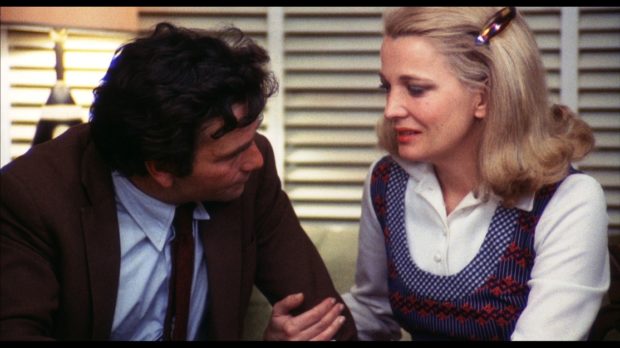
John Cassavetes’ acclaimed film from 1974 features Gena Rowlands in the title role as a woman who can’t fit into the narrow role of a wife that is expected of her.
A Woman Under the Influence, released in 1974, is regarded by many as the finest achievement by the independent filmmaker John Cassavetes. It got him an Oscar nomination for Director, and a Best Actress nomination for his wife, the great Gena Rowlands, in the title role. But like all of Cassavetes’ films, it challenges what most audiences expect a movie to be.
Nick (Peter Falk), a manager at a construction firm, loves his wife Mabel (Gena Rowlands), but her mental instability and extremely erratic behavior leads to a crisis in their marriage. The style employs long scenes that allow the actors to inhabit time in the messy ways that real people do, rather than with the usual dramatic compression and emphasis. For example, an extended sequence early in the film has Nick bringing his co-workers to his home for an impromptu breakfast in which, amidst all the back and forth talk of a large group of people around a table, we gradually notice the tension between Nick and Mabel, and Mabel’s odd, socially awkward behavior. Rather than try to portray this fact with some quick narrative shorthand, Cassavetes’ technique makes the truth of the situation soak into your mind, much as it might in your lived experience.
The director doesn’t want to tell us a story; he wants to give us the illusion of actually being there with these people. Amazingly, he pulls it off—the events we witness range from riveting to boring, but it all seems strangely “real,” as if we were seeing something more elemental than acting. In fact it’s an illusion—the picture seems improvised, but it’s actually one of Cassavetes’ more carefully scripted works, and the result is a film that is profoundly, uniquely unsettling.
Gena Rowlands’ performance is beyond praise. In almost every film depicting mental illness, there’s a certain predictability in the way a disturbed or insane person is portrayed, as if we were meant to understand the character and thereby come to some sort of conclusion that the writers and directors intended us to have. In contrast to this, Rowlands’ character seems completely unpredictable and outside the realm of what we expect to see, and thus she seems exactly like a mentally ill person might seem. There’s nothing romantic about it, nor does the film adopt a judgmental, clinical, or tragic point of view regarding her behavior. She’s just there, in all her aspects (some of which seem quite “normal,” others not) and the force of her disturbance is allowed to be felt in all its perplexity, difficulty, and pain.
But this is not to say that we can’t draw conclusions. As we get to know Peter Falk’s character, it becomes evident that he’s unable to govern his rage, and that his need to control everything around him makes him possibly as nutty as his wife. But the fact that he’s a man makes his behavior somehow more acceptable to the people around them. Mabel’s episodes, which look a lot like manic depression, occur in the context of an idea of passive wifehood and motherhood that is intolerable to a person with her pride and energy.
Cassavetes’ intense focus on the momentary and the concrete produces an emotional involvement that you rarely see in the movies. The long ending sequence, when Mabel comes home from a psychiatric hospital to be welcomed by her nervous extended family, is a masterpiece of rising tension and discomfort. The film ends on a curiously hopeful note which nevertheless remains tentative. The special atmosphere of A Woman Under the Influence, and Rowlands’ incredible performance, will stay with you for a long time.

Todd Haynes tells the story of this influential New York rock band in the cinematic style of the man who discovered them: Andy Warhol....

Claire Denis’ new film examines the cycle of hope, expectation and disappointment in the life of a woman looking for the right man. The...

Gloria, a new film from Chile, seemed top be such a simple story that I thought “Why should I see this?” until I finally...